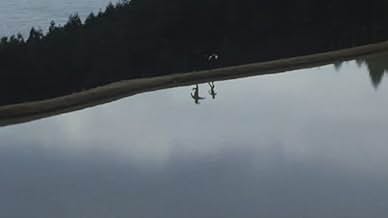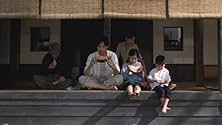IMDb RATING
7.5/10
7.9K
YOUR RATING
A young woman's husband apparently commits suicide without warning or reason, leaving behind his wife and infant.A young woman's husband apparently commits suicide without warning or reason, leaving behind his wife and infant.A young woman's husband apparently commits suicide without warning or reason, leaving behind his wife and infant.
- Director
- Writers
- Stars
- Awards
- 9 wins & 1 nomination total
- Director
- Writers
- All cast & crew
- Production, box office & more at IMDbPro
Featured reviews
I don't think I have ever witnessed a film, in which the cinematography was so outstanding that it really was the star of the picture. This film, about a Japanese woman who remaries and moves to a small fishing village after her last husband comits suicide is less about the story but more about its surroundings. Scenes are mostly taken and shot from a distance with little camera movement, in a way they become living paintings. Blues, reds, and greens come in to accent shots, moving vehicles enter to give splash of colour and brilliant contrast. The actors are distant. I couldn't take my eyes let alone blink for the fear of missing something amazing. The simple act of a child throwing a pink ball, to the sunlit rooms that get illuminated, to blue paint in fishing boats it all had me engrossed. I found myself more as a participant in a museum gallery of high art than being engaged in a plot or story not that there isn't one or that it was bad. I have never witnessed a film like this and even found that just the scenes themselves and the background of story brought so much emotion out of me.
A remarkable piece of cinema
Rating 9 out of 10
A remarkable piece of cinema
Rating 9 out of 10
And beautiful and fascinating film with a gentle lyric quality. Runs directly counter to the usual Hollywood expectations. The most emotionally packed scene is filmed in extreme longshot! You can't even see the faces of the actors but the location and the action that you can see are enough. If you want to see a standard hollywood formula, then stay away. If you like quiet and moving films shot in entirely new ways (granted the director owes much to Ozu) then get this film.
Steeped in the traditions of the lush visual beauties of Japanese cinema, and influenced by the likes of Taiwanese (?) director Hsiao Hsien Hou (I believe there are several fairly direct quotes) or the luminous cinematography of Bergman's long time cameraman, Sven Nykvist. This film directly mines the visual effects of some of the most glorious European painters of light like Vermeer, Caravaggio, and Georges de la Tour. From the subtitles it seems that MABOROSI means 'strange light' and Kore eda uses almost nothing but strange, rich luminosity to tell his story (although he also gets a fine, somber perfomance from his female lead). Each shot is deeply thought out and composed to the maximum. Literally, every single shot. The results are tranquil and beautiful. The story is as quiet as the light, and probably if you require your film to have a strong direct narrative you should stay away from this as the story is told very subtly using light and almost subliminal sound (it seemed to me there were ocean waves in the sub background even in the city shots, for example). It works great as cinema. I would suggest that you watch at least the first 20 minutes or so again, after watching the whole film. The same motifs cross and criss cross all through the film and it really builds a wonderful texture.
I would recommend this as a double bill with something like the Actor's Revenge by Ichikawa- also deeply steeped in lush visual beauties and light. Or else Angel Dust by Sogo Ishii-a very opposite film full of passion, madness and violence, but where you see that meticulous, relentless search for supercomposition on almost a frame for frame basis. Or lastly, the tranquil, and beautiful, and very painterly Why Has Bodhidharma Left For The East- a Korean film by Bae Yong Kyun and something of a successful Zen meditation. Well one more, Mystery of Rampo-by Kazuyoshi Okuyama- very offbeat with bewitchingly lush visual beauty. (Rampo is Japanese for Edgar Allen Poe and the first Japanese mystery writer adopted Rampo as his nom de plume)
I would recommend this as a double bill with something like the Actor's Revenge by Ichikawa- also deeply steeped in lush visual beauties and light. Or else Angel Dust by Sogo Ishii-a very opposite film full of passion, madness and violence, but where you see that meticulous, relentless search for supercomposition on almost a frame for frame basis. Or lastly, the tranquil, and beautiful, and very painterly Why Has Bodhidharma Left For The East- a Korean film by Bae Yong Kyun and something of a successful Zen meditation. Well one more, Mystery of Rampo-by Kazuyoshi Okuyama- very offbeat with bewitchingly lush visual beauty. (Rampo is Japanese for Edgar Allen Poe and the first Japanese mystery writer adopted Rampo as his nom de plume)
In 1998 the Japanese director Hirokazu Koreeda astonished those of us who feel passionately about the expressive power of cinema with "After Life" a film about the hereafter that I would claim to be one of the masterworks of the past decade. The effect of this was so mesmerising that for some time I completely forgot about "Maborosi" an earlier work that I had caught up with only a few days before. Although not in the same league, it is worth a look if only to trace the origins of the later piece. Just as "After Life is a meditation on life from the point of view of the dead, "Maborosi" reverses the process and meditates on death from the living's perspective. A young girl feels somehow responsible for the death of her grandmother whom she cannot persuade to return to the family home after she wanders off one day. As a young woman she again is unable to escape a feeling of guilt when her husband is unaccountably struck down and killed by a train. These events happen fairly quickly in the first third of the film. The rest is an elegiac account of her second marriage to a widower with a young daughter and their life together in a remote fishing community as far away from the cramped streets of the city as it is possible to imagine. With the baby son by her first husband now grown to a small boy the new family feels complete. And yet the woman still exists in a state of unease. Although there are no more disasters, there are continual reminders of the frailty of life. An elderly woman, not unlike her grandmother, takes a boat out in a storm but returns unharmed. On a later occasion she watches an anonymous funeral procession which seems held in longshot for an eternity. "Marobosi" which means "The Beckoning Light" - a clear reference to death - is full of the influences of other directors. There is that of Ozu in the many domestic interiors where the camera seldom moves, Angelopoulos in the many long held exterior vistas and even Hou Xiaoxian in the way the audience is made to concentrate hard to work out character reactions and situations given a minimum of verbal and visual information. One curious fact about the film is the way the characters either appear in shadow or middle distance so that their emotions are hard to recognise. In the end this effect of deliberately distancing the protagonists is the film's essential weakness. It gives a sense of detachment and uninvolvement that Koreeda was to overcome triumphantly in the marvellous "After Life".
Did you know
- TriviaHirokazu Koreeda's directorial film debut.
- How long is Maborosi?Powered by Alexa
Details
- Release date
- Country of origin
- Official site
- Language
- Also known as
- La lumière de l'illusion
- Filming locations
- Production company
- See more company credits at IMDbPro
Box office
- Gross worldwide
- $144,025
Contribute to this page
Suggest an edit or add missing content
























